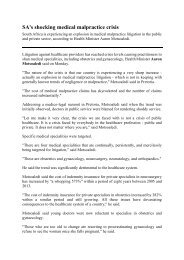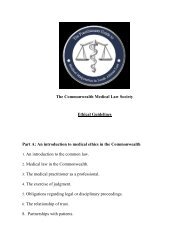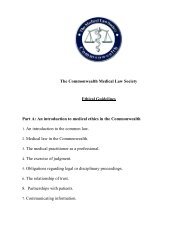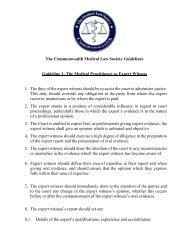WEEKLY BULLETIN: 20 FEBRUARY 2015
You also want an ePaper? Increase the reach of your titles
YUMPU automatically turns print PDFs into web optimized ePapers that Google loves.
A covenant of trust.<br />
“The goals of medicine as a profession dedicated to healing and caring of the sick in a<br />
dignified manner depend very much on a stable and trusting doctor-patient<br />
relationship…Adopting a patient centered philosophy in the doctor-patient relationship<br />
imposes the duty on doctors to do the utmost in caring for patients, and allows the sick to<br />
claim their right to humane and dignified care from doctors. As suggested in an editorial<br />
in Lancet a year ago, the terms “patient”, and not “customer” or “client” as some would<br />
advocate, best portrays this fiduciary nature of the relationship. Only by restoring the<br />
element of trust in this ageless patient-physician covenant, can the soul of the medical<br />
profession be restored and preserved regardless of technological and social changes in<br />
society”. The full article can be read at: http://www.uni-hildesheim.de/~beneke/WS03-<br />
04/Thesen04.pdf.<br />
10 Things You Want To Know About Medical Malpractice<br />
By Demetrius Cheeks<br />
Fact: According to the Journal of the American Medical Association (JAMA), medical<br />
negligence is the third leading cause of death in the U.S.—right behind heart disease and<br />
cancer.<br />
In <strong>20</strong>12, over $3 billion was spent in medical malpractice payouts, averaging one payout<br />
every 43 minutes.<br />
Alarming, right?<br />
But there are things that you can do to avoid becoming an unfortunate part of these<br />
statistics—to be your best health-care advocate. Jason Konvicka, a partner in the Virginiabased<br />
law firm of Allen, Allen, Allen & Allen, should know.<br />
Named as one of the state’s “Super Lawyers,” the seasoned trial attorney has won some of<br />
the largest personal-injury awards on record in the state, and recently secured the largest<br />
malpractice award in Virginia state court history.<br />
LearnVest sat down with Konvicka to discuss troubling trends in medicine and hear his<br />
advice on how people can lessen their risk of encountering medical malpractice.<br />
Jason Konvicka: Medical malpractice occurs when a health-care provider deviates from<br />
the recognized “standard of care” in the treatment of a patient. The “standard of care” is<br />
defined as what a reasonably prudent medical provider would or would not have done<br />
under the same or similar circumstances. In essence, it boils down to whether the provider<br />
was negligent.<br />
How do you determine if someone is the victim of medical negligence?<br />
A malpractice claim exists if a provider’s negligence causes injury or damages to a patient.<br />
However, experiencing a bad outcome isn’t always proof of medical negligence. Also, on<br />
occasion, health-care providers will inform a patient that the person has received negligent<br />
medical care from a previous health-care provider and—presumably in an effort at

















